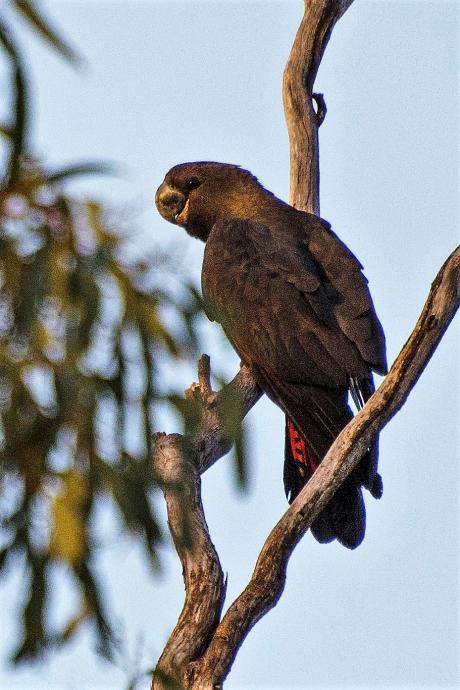Glossy Black Cockatoo Count on the 25th & 26th March 2017
 The total number of man hours and fuel consumed to conduct a count like this is huge and I thank you all for your generosity especially of time as that is the most valuable thing that you have.
The total number of man hours and fuel consumed to conduct a count like this is huge and I thank you all for your generosity especially of time as that is the most valuable thing that you have.
The total number of birds sighted was 22 with the greatest number found in the Cocoparras (10) and around Brobenah (9). 3 more were seen at Square Nob.
I think the count was held a bit late as the birds are beginning to nest although they still must drink. I think they drink near where they are feeding and possibly near where they are nesting.
The numbers are similar to 2016 but are reduced from previous years and much less than the Rankins Springs Count last month which yielded more than 100. (Why is this so?)
Interesting were the Major Mitchells which drank at one of the dams near Leeton. This threatened species seems to be increasing in number which may be as a result of a constant supply of food in the form of commercial walnuts. Major Mitchells require smaller nesting hollows and hopefully there’s enough for everyone or else we had better get planting. (I know where we could)
Glossy Black Cockatoos require large hollows and many of these trees were cleared historically for building and fencing. The trees which are large enough are found on roadsides or travelling stock reserves and a few areas that landholders did not clear (Thank God for them).
Birds found at most sites were Common Bronzewing, Crested Pigeon, Kookaburra, Australian Raven, Galah, Pee-wee, Willy Wagtail and White–faced Herons. Noisy miners were also everywhere possibly as a result of fragmentation of the landscape.
Other threatened species like the Grey-crowned Babblers and the Diamond Finches tended to be where the Glossy Black Cockatoos were found.
43 different species of birds were found and 4 species of mammal Grey Kangaroo, Red Kangaroo?? Black Wallaby and Fox.
Farm dams add to the biodiversity of our landscape in many different ways. Thanks to the landholders who assisted and allowed us on their properties.
Nella Smith
